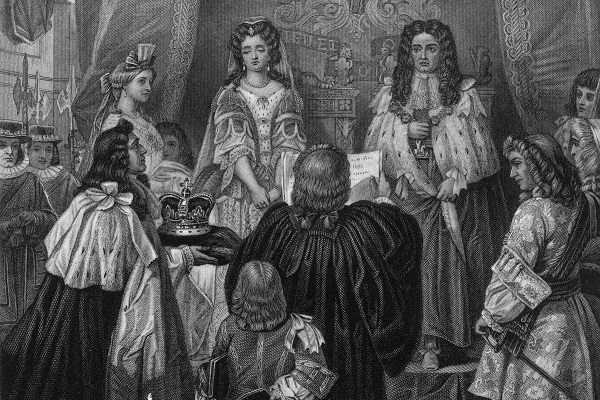From a dialogue between a non-juring clergyman and his wife by Edward ‘Ned’ Ward
Wife: Why will you prove so obstinate, my dear,
And rather choose to starve, than yield to swear?
Why give up all the comforts of your life,
Expose to want your children and your wife;
Hug your own ruin through a holy pride,
Which interest calls you now to lay aside;
And common safety, that prevailing plea,
Justifies those who wisely do agree?
Consider, therefore, and in time comply,
You may, perhaps, on some mistakes rely;
And then, how fatal ‘twould hereafter be,
That error should beget our misery?
Secure the living first you’ve long possessed,
And then discuss the point within your breast;
Postpone your conscience till you’ve once complied,
Then if you ‘gainst your self the cause decide,
You’ll find your error on the safest side.
Husband: Thou talk’st, alas! like Job ‘s unhappy wife,
Who bid him curse the God that gave him life;
Or like unhappy Eve, whose ill advice
Lost Adam and herself their Paradise.
No, female Satan, I abhor thy pride;
My rule of faith’s my conscience, that my guide:
Nor shall I waver from so just a cause,
That’s firmly built on Heav’n’s eternal laws.
Shall I that doctrine I have taught, explode,
To prove my self a hypocrite of mode?
Preach one thing, and, by vile example, shew
I long have taught what I confess untrue?
I was on the last train home from King’s Cross last night, sharing a carriage with an Anglican priest who was moaning bitterly about the ‘so-called Glorious Revolution’ and the ‘bloody Whigs’. The Whigs were opponents of James II who distrusted him because he was Catholic. They finally got rid of him in 1688 when they invited the Dutch ruler William of Orange to come to England with his army. No prizes for working out that it wasn’t James who called the invasion ‘Glorious’.
Once William was installed as king anyone with any kind of authority had to swear allegiance to him and renounce their previous oaths to James. Most did but many, like the husband in this dialogue, were uneasy. As his wife points out they stood to loose their livelihoods if they refused. But even some who had really disliked James couldn’t let go of the idea that a promise is a promise – and a promise to someone who stands for your whole country is a pretty serious one. Those who refused to swear loyalty to William were called non-jurors.
So why does all this still make people angry after more than three hundred years? I think it must be because the same sorts of question are still important to us. The same goes for the Civil War, which, from readers’ comments, I know many of you care deeply about. Of course we discuss our political problems on the Coffee House blog whilst our ancestors – not yet blessed with the internet – were more likely to publish poetry as a way of spreading ideas and shaping opinion. But we, like them, are bothered by how quickly we should change our minds with the times.
The Whigs – like the revolutionaries who executed Charles I – were happy to throw aside the ancient idea of hereditary monarchy because they thought they had a better idea about what the country should be like. The people, they argued, have this right. But what right do we really have to remake our own society? And what duty do we have to respect the laws and traditions history has given us?
In general, the further left someone is on the political spectrum today the more comfortable they’ll be with the idea that we should be able to reshape society as we see fit. It’s more complicated on the right but small-c conservatism is based on the idea that we have a duty to preserve what we have inherited. For some that might be pragmatic – don’t throw away tradition’s inherited wisdom. For others it might be moral – we have no right to change our principles just because it seems convenient. I can imagine plenty of arguments along both lines from, for example, opponents of gay marriage.
The non-juror in this dialogue takes this moral position. His wife focuses on the material consequences of giving up his job. But she also points out that ‘common safety’ (i.e. the national interest) has given lots of people a good reason for pledging allegiance. And personal conscience is a shaky foundation for self-sacrifice. You can easily end up making an unhappy fool of yourself for the sake of a mistake. Why not ‘postpone your conscience till you’ve once complied’? She means ‘do what everyone else is doing right now, and worry about the rights and wrongs later’.
If she is pragmatic, her husband is principled. The reasons he gives for his stubbornness are faith, conscience and consistency. What he fears is becoming a hypocrite. How, as he asks, can he ‘preach one thing, and, by vile example, shew I long have taught what I confess untrue?’. A priest, he believes, teaches his flock to maintain the moral principles without which a society cannot flourish. And he can only do so if he also lives by them.
Be cautious before you give the vicar your admiration. This poem was written to make you feel just that way by a political polemicist who hated the Whigs. Principle is a fine thing and there a plenty of hypocrites in the world. But unless we really do live in the best of all possible worlds, shouldn’t we be able to change our minds sometimes? Perhaps there are times when we have to alter things to preserve them in a changing world. Locking ourselves into a rhetorical strait-jacket where the only options are blind loyalty and hypocrisy isn’t a good way to prepare for such moments.






Comments